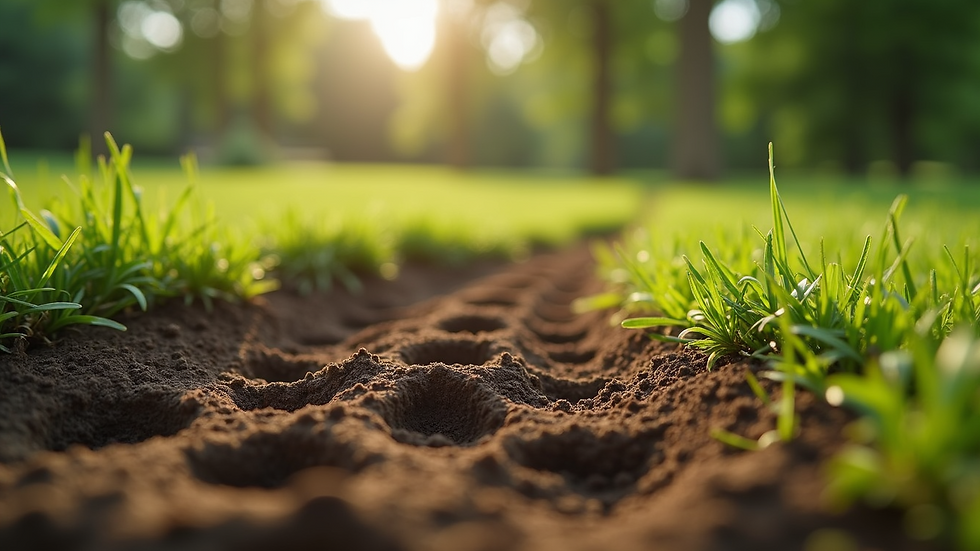Top Tips for Maintaining a Beautiful Lawn in Madison
- totalguardllc
- Oct 31
- 4 min read
A lush, green lawn is the pride of many homeowners in Madison. It enhances curb appeal, provides a relaxing outdoor space, and can even increase property value. However, maintaining a beautiful lawn requires consistent care and attention to the unique climate and soil conditions of the Madison area. This guide offers practical tips to help you achieve and sustain a healthy lawn throughout the year.
Essential Madison Lawn Care Practices for a Vibrant Yard
Madison's climate, with its cold winters and warm summers, demands specific lawn care strategies. Here are some foundational practices to keep your lawn thriving:
Soil Testing and Preparation: Begin by testing your soil's pH and nutrient levels. Madison soils often benefit from lime applications to balance acidity. Adjusting soil conditions ensures grass roots absorb nutrients effectively.
Choosing the Right Grass Type: Cool-season grasses like Kentucky bluegrass, perennial ryegrass, and fine fescues are ideal for Madison. These grasses tolerate cold winters and recover well in spring.
Proper Mowing Techniques: Mow your lawn regularly, keeping grass height between 2.5 to 3.5 inches. Avoid cutting more than one-third of the grass blade at a time to prevent stress.
Watering Wisely: Water deeply but infrequently, aiming for about 1 inch per week. Early morning watering reduces evaporation and fungal risks.
Aeration and Overseeding: Aerate compacted soil in early fall to improve air and water penetration. Follow with overseeding to fill bare spots and thicken the lawn.

Freshly mowed lawn showcasing healthy grass blades in Madison
How to Optimize Madison Lawn Care Throughout the Seasons
Each season in Madison presents unique challenges and opportunities for lawn care. Tailoring your approach seasonally will maximize lawn health.
Spring
Rake away winter debris and dead grass.
Apply a pre-emergent herbicide to prevent crabgrass.
Fertilize with a balanced, slow-release fertilizer to encourage growth.
Begin regular mowing as grass starts growing.
Summer
Increase watering frequency during dry spells but avoid overwatering.
Mow higher to shade roots and reduce heat stress.
Monitor for pests like grubs and treat promptly.
Spot-treat weeds to prevent spreading.
Fall
Aerate and overseed to repair summer damage.
Apply a high-phosphorus fertilizer to strengthen roots.
Rake leaves regularly to prevent smothering.
Gradually reduce mowing height as growth slows.
Winter
Avoid heavy foot traffic on frozen grass.
Clear snow and ice buildup to prevent mold.
Plan for spring lawn care based on fall observations.

Close-up of aeration improving soil health in Madison lawn
What's the difference between lawn care and lawn service?
Understanding the distinction between lawn care and lawn service can help you decide how to maintain your lawn effectively.
Lawn Care refers to the ongoing, hands-on maintenance activities you perform yourself or hire someone to do. This includes mowing, watering, fertilizing, aerating, and weed control. Lawn care focuses on the health and appearance of your lawn through regular attention.
Lawn Service typically involves professional companies offering comprehensive packages. These services may include seasonal treatments, pest control, disease management, and sometimes landscaping. Lawn services often use specialized equipment and expertise to address complex lawn issues.
Choosing between DIY lawn care and professional lawn service depends on your time, budget, and lawn condition. Many homeowners in Madison find a combination of both approaches works best.

Professional applying fertilizer as part of lawn service in Madison
Tips for Weed and Pest Control in Madison Lawns
Weeds and pests can quickly damage your lawn if not managed properly. Here are some effective strategies:
Identify Common Weeds: Dandelions, clover, and crabgrass are prevalent in Madison. Early identification helps in targeted treatment.
Use Pre-Emergent Herbicides: Apply these in early spring to prevent weed seeds from germinating.
Spot Treat Weeds: Use selective herbicides or manual removal for isolated weed patches.
Control Pests: Watch for signs of grubs, chinch bugs, and armyworms. Use appropriate insecticides or natural predators to manage infestations.
Maintain Lawn Health: A thick, healthy lawn naturally resists weeds and pests by outcompeting them.
When to Seek Professional Help for Your Madison Lawn
Sometimes, despite your best efforts, your lawn may require expert attention. Consider professional lawn care services madison if you notice:
Persistent weed or pest problems.
Patchy or thinning grass despite proper care.
Soil issues that need specialized treatment.
Lack of time or equipment for regular maintenance.
Desire for seasonal treatments and expert advice.
Professional services can save you time and ensure your lawn remains beautiful year-round.
Enhancing Your Lawn’s Beauty with Seasonal Landscaping
Beyond basic lawn care, adding seasonal plants, flower beds, and edging can elevate your yard’s appearance. Consider:
Planting native flowers that thrive in Madison’s climate.
Using mulch to retain moisture and reduce weeds.
Installing borders to define lawn areas.
Incorporating garden lighting for evening ambiance.
These enhancements complement your lawn care efforts and create a welcoming outdoor space.
Maintaining a beautiful lawn in Madison is achievable with the right knowledge and consistent care. By following these tips and knowing when to seek professional help, you can enjoy a vibrant, healthy lawn that enhances your home’s beauty throughout the seasons.




Comments